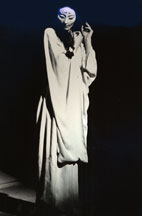portals

WEEK ONE (January 5 & 8)
The purpose of a weekly link called portals is to provide insights into the class topics and assignments. Think of the portals as context and overview, not just in terms of class topics, but also for the learning goals outlined in the syllabus. Suggested readings and announcements will also appear in portals.
-- Mark Harrison
ANNOUNCEMENTS:
There will be no screening this week to allow extra time for Saturday reading assignments.
Please read How I Learned to Drive out loud (and ideally with someone else!)
Our primary reading, How I Learned to Drive, will provide a starting point for our study. There are two other required readings: a fragment from Peter Brook's The Empty Space and "Driving Ms. Vogel," both available as links on the program calendar.
SUGGESTED READINGS
Brockett and Findlay. Century of Innovation (an excellent overview of theatre developments)
Brook. The Empty Space (entire "Deadly" and "Rough Theatre" chapters)
Styan. The Dramatic Experience
THOUGHTS:
"Old forms of communication are not unaffected by the development of new ones,
nor do they survive along side them."
-- Bertolt Brecht
What does it mean to be a "living art form?" What is essential to the theatre experience? In what ways has theatre been eclipsed by the screen mediums? On the other hand, what is possible on the stage that cannot be captured on the screen?
The answers to these questions are complicated, to say the least. But a central concept that will help us in our study is TRANSFORMATION -- of space, time, character, object and action. How, for example, do scenes in a play or opera travel from one distinct world to another? Using no stage directions Shakespeare begins many of his plays with a sequence of scenes that occur in different places and at various times. Shakespeare's technique is almost cinematic -- like a cut in a film -- except that the stage poses serious limitations on our ability to move in efficient and imaginative ways from one place (and time) to another. How does this shift take place, particularly in the absence of realistic devices?
Other topics we'll examine:
- The Cornell box
- Theatre as community: the dynamics of a living art form
- Play analysis for the director and active reader
- What conventions are truly unique to the stage
- Development of a working theatre vocabulary (action, obstacle, theme, staging, etc.)
- Focus on spoken words and action in theatre; music and action in opera
